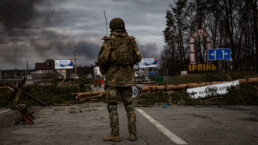Wars harm climate action because large militaries emit a lot and military spending diverts money away from tackling climate change
By Nick Buxton and Deborah Burton, Climate Change News
The failure of the richest countries to meet their 2009 commitment to provide $100 billion in climate finance to impoverished and climate vulnerable countries has long sowed distrust and hindered climate negotiations.

The broken promise is even more stark, given President Biden’s request to Congress this October for $105 billion additional funding to pay for Israel’s devastating war on Gaza and to support Ukraine against Russia.
Resources that never materialise to address the climate emergency seem to be easily available when it comes to supporting wars. As we approach the UN climate talks in Dubai, the impact of war and the military on the climate can no longer be ignored.
Big Emitters
The failure to assess the military contribution to climate change historically is partly deliberate.
The US government in 1997 said it would only sign the Kyoto agreement if the military were explicitly exempted from reporting and reducing emissions.
Recent Posts
‘Unconstitutional. Unethical. Authoritarian.’ ICE Bars Millions Of Immigrants From Bond Hearings
July 18, 2025
Take Action Now One watchdog said the new policy “seems like a blatant attempt to stop them from exercising their right to due process.”……
Americans Are Not Nearly Alarmed Enough About Climate Change
July 18, 2025
Take Action Now Americans still don’t comprehend how imminent, dangerous, and far-reaching the threat is—and journalists are partly to blame.By…
The IRS Is Building A Vast System To Share Millions Of Taxpayers’ Data With ICE
July 17, 2025
Take Action Now ProPublica has obtained the blueprint for the Trump administration’s unprecedented plan to turn over IRS records to Homeland Security…
Israel’s Sudden Assault On Syria Is Unchecked Aggression
July 17, 2025
Take Action Now Jerusalem is bombing Damascus and threatening al-Sharaa’s rule, while Washington was hoping to help the nascent government on…




